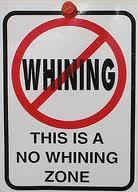No Whining Allowed
 I have found something that I am an expert on: whining.It's such a great word. Just to say it sounds like whining.What qualifies me as an expert?Three grown children and now four grandchildren. Children seem to whine naturally, and mine were good at it from their earliest days. Their children are continuing the tradition."Mommmm!"“He's touching me!”"Mannn, that's not fair!"
I have found something that I am an expert on: whining.It's such a great word. Just to say it sounds like whining.What qualifies me as an expert?Three grown children and now four grandchildren. Children seem to whine naturally, and mine were good at it from their earliest days. Their children are continuing the tradition."Mommmm!"“He's touching me!”"Mannn, that's not fair!"
'I'm so good at it.'
But the real reason I'm an expert on whining is not that my children were so good at it. It's because I'm so good at it. Since I'm a "weather wimp,” my whining often centers on climate control: "It's sooo hot (or cold, or wet or whatever)." My other typical whines: "I really need new shoes…freezer…time by myself…” "Look at this mess!" “I could do this so much more efficiently.” Why do we whine? Whining is about “dissing”--a way for us to express our displeasure, our dismay, our disagreement, our disappointment, our dissatisfaction. We often whine about things we can do nothing about, which then leads to a habit of whining about things we could do something about. And what does whining accomplish? It solves no problems, but it has many predictable consequences: It puts us in a negative frame of mind, it is depressing or discouraging to the people around us, it presents a negative model to our children and others we would want to influence and it eats away at our trust in God. Each of us will encounter many disagreeable circumstances. How we respond is our choice. We can whine or we can choose a more positive approach. I have found two attitudes especially helpful in transforming my tendency to whine into a positive response to negative circumstances.
Giving Thanks
The first attitude is gratitude. We know the Word of God tells us we are to express gratitude in all things: "Give thanks in all circumstances, for this is God's will for you in Christ Jesus" (1 Thess. 5:18). When things are going the way we like, that's not hard for us to do, though we don't always remember. But when things are not going the way we like, we find it much more difficult to say "Thank you" to God. When there is a major illness, financial setback, loss of a job, a difficult relationship or the death of a loved one, the words "Thank you, Lord" just don't seem to make it past our lips.. When we choose to say "Thank you" rather than whine, we are acknowledging who God is: He is the great, powerful, almighty, creator of the universe. He loves us with an everlasting, unconditional love. He is good and therefore all that He does is good. We are declaring that we trust Him. A grateful heart displaces a whining spirit.
Being Content
The second attitude I have found useful in confronting my tendency to whine is contentment. Frequent whining is a sure sign that I am not content. The apostle Paul gives us many reasons that he had not to be content: He was scorned and mocked. He was stoned, shipwrecked and beaten. He suffered hunger, rejection and imprisonment (1 Cor. 9:4-13; 2 Cor. 11:23-27). But he found the secret of contentment. Most of us continually live with a "greener grass" mind frame. We are convinced that something different, something new or something more will be better. One of my favorite sayings is that "the greener grass has been spray-painted by the evil one." We whine about our present circumstance, certain that change will bring what we desire. Yet those desires are often just temptations sent from the evil one to seduce us from trusting God. The pastures that God has prepared for us are rich, lush and satisfying. "Contentment is essentially a matter of accepting from God's hand what He sends because we know that He is good and therefore that it is good" (J. I. Packer). A contented heart overcomes a whining spirit. Gratitude and contentment can banish whining any day, every day. What have you whined about lately? Are you yearning for fake greener grass? Have you said, “Thank You, Lord”? c2011 Judy Douglass
